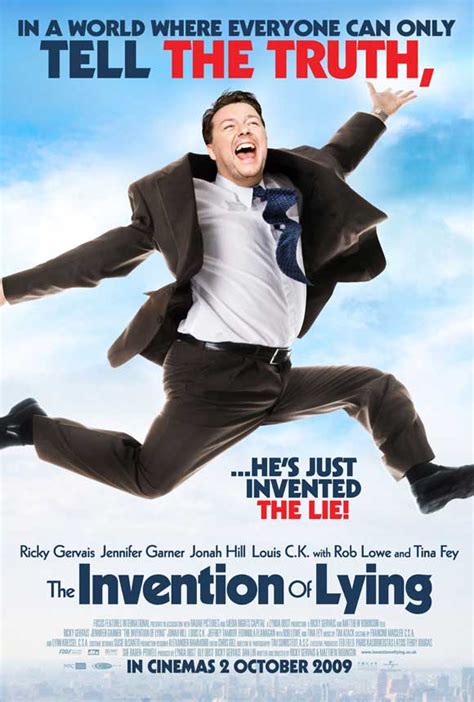In a world where dishonesty is nonexistent, a struggling screenwriter named Mark Bellison, played by Ricky Gervais, finds himself at the forefront of a revolution. The 2009 film “The Invention of Lying” presents a thought-provoking premise that challenges the audience to consider the implications of a society where everyone tells the truth, no matter how brutal or hurtful. This concept, while fascinating, also raises questions about the role of deception in human relationships and the potential consequences of its absence.
The movie takes place in a reality where people are genetically predisposed to tell the truth, making it impossible for them to lie or even bend the truth. This trait affects every aspect of life, from personal relationships to professional interactions. Mark, who is desperate to impress his love interest, Anna, played by Jennifer Garner, and to advance his career, finds himself struggling to navigate this truthful world. His life takes a dramatic turn when he discovers that he can lie, and this newfound ability sets him on a path that will change the course of his life and the lives of those around him.
One of the most striking aspects of “The Invention of Lying” is its exploration of how a society without deception would function. The film depicts a world where people say exactly what they think, without any filter or consideration for others’ feelings. This leads to some humorous and awkward moments, as characters openly express their true thoughts and feelings, often with devastating consequences. However, as Mark begins to utilize his ability to lie, the film delves into the complexities of human relationships and the ways in which honesty and dishonesty can both unite and divide people.
The film’s use of satire to comment on modern society is also noteworthy. By presenting a world where everyone tells the truth, the movie highlights the ways in which dishonesty can be both a necessary evil and a fundamental aspect of human interaction. The script cleverly uses Mark’s newfound ability to lie to expose the hypocrisies and flaws of the truthful society, revealing that even in a world without deception, people can still be cruel, selfish, and manipulative. This commentary serves as a reminder that honesty and dishonesty are not always binary concepts, but rather exist on a spectrum that is influenced by context, culture, and personal relationships.
In terms of its themes, “The Invention of Lying” explores several complex ideas, including the nature of truth, the power of deception, and the human condition. The film raises questions about whether a world without lies would be utopian or dystopian, and whether the benefits of honesty outweigh the potential drawbacks. Through Mark’s journey, the movie also examines the consequences of playing god with the truth, highlighting the potential risks and benefits of manipulating reality.
The cast of “The Invention of Lying” delivers strong performances, bringing depth and nuance to their characters. Ricky Gervais, who also co-directed and co-wrote the film, shines as Mark, conveying a sense of vulnerability and desperation that makes his character relatable and sympathetic. Jennifer Garner, as Anna, provides a compelling counterpoint to Mark’s antics, and the chemistry between the two leads is undeniable. The supporting cast, which includes Rob Lowe, Tina Fey, and Jonah Hill, adds to the film’s humor and charm, making the movie an enjoyable and engaging watch.
From a technical standpoint, the film’s cinematography and production design are noteworthy. The movie’s use of a muted color palette and a blend of realistic and stylized settings creates a unique visual aesthetic that complements the film’s themes and tone. The editing is also effective, using a combination of quick cuts and long takes to convey the chaos and unpredictability of Mark’s newfound ability to lie.
In conclusion, “The Invention of Lying” is a thought-provoking and engaging film that challenges our assumptions about the role of deception in human relationships. Through its use of satire and social commentary, the movie provides a fresh perspective on the complexities of honesty and dishonesty, highlighting the ways in which both can be used to manipulate and control others. With its strong performances, clever writing, and effective technical elements, “The Invention of Lying” is a must-see for anyone interested in exploring the nuances of human interaction and the power of deception.
What is the central premise of the film "The Invention of Lying"?
+The film takes place in a world where everyone tells the truth, and the main character, Mark, discovers that he can lie, which sets him on a path that will change the course of his life and the lives of those around him.
How does the film use satire to comment on modern society?
+The film uses satire to comment on modern society by presenting a world where everyone tells the truth, highlighting the ways in which dishonesty can be both a necessary evil and a fundamental aspect of human interaction.
What themes does the film "The Invention of Lying" explore?
+The film explores several complex themes, including the nature of truth, the power of deception, and the human condition, raising questions about whether a world without lies would be utopian or dystopian.
The film’s use of a unique premise and its exploration of complex themes make it a fascinating watch, and its commentary on modern society serves as a reminder that honesty and dishonesty are not always binary concepts. As we consider the implications of a world without lies, we are forced to confront the ways in which deception can both unite and divide us, and to question the true nature of reality. Ultimately, “The Invention of Lying” is a film that will leave you thinking long after the credits roll, challenging your assumptions about the role of deception in human relationships and the consequences of manipulating reality.


